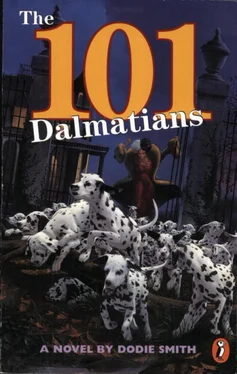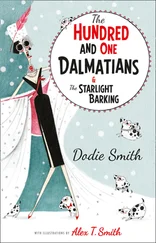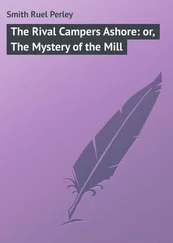By now they were almost at the stableyard.
“Don’t tell me any more now, Colonel,” said Pongo.
“I’m too excited to take it in. Are you all right, Missis?”
For Missis was trembling. “I can’t believe I’m really going to see them,” she said.
The Colonel opened the gate to the stableyard. Missis gave a soft moan and hurled herself across the yard. She had seen Lucky. There he stood, at the back door, waiting for them.
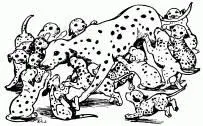
And behind him, in the long, dark passage leading to the kitchen, were all his brothers and sisters. Who could describe what the mother and father felt during the next few minutes, as they tried to cuddle fifteen wagging, wriggling, licking puppies all at once? Everyone tried to be quiet, but there were so many whimpers of bliss, so much happy snuffling, that the Sheepdog got nervous.
“Will they hear in there?” he asked Lucky.
“What, the Badduns?” said Lucky—rather indistinctly, because he had his mother’s ear in his mouth.
“No, they’ve got their precious television on extra loud.”
Still, the Colonel was relieved when the first joy of the meeting was over.
“Quiet, now!” said Pongo.
“Quiet as mice!” said Missis.
But they were pleasantly surprised at how quiet the pups instantly were. The only sound came from some dead leaves stirred by fifteen lashing little tails.
“Now, still!” said Lucky.
All the tails stopped wagging.
“I’m teaching them to obey orders,” said Lucky to the Colonel.
“Good boy, good boy. Let’s see, I made you a Corporal this afternoon, didn’t I? I now make you a Sergeant. If all goes well, you shall have your commission next week. Now I’m off to see my little pet, Tommy, have his bath.”
He told Pongo he would be back in a couple of hours. “Slip out and tell me what you think of things—or send the Sergeant with a message.”
“Won’t you come in and see the T.V., sir?” said Lucky.
“Not while the Badduns are awake,” said the Colonel. “Even they couldn’t mistake me for a Dalmatian.”
As soon as he had gone, Lucky sent the other puppies to the kitchen, then took his father and mother in.
“You must stay at the back until your eyes get used to the dark,” he said.
And indeed it was dark! The only light came from the television screen and the kitchen fire, which were at opposite ends of the very large kitchen. And as the walls and ceiling were painted dark red, they reflected no light. It was extremely warm—much warmer than one fire could have made it. This was because there was central heating. Cruella de Vil had put it in when she planned to live in the house.
At last Pongo and Missis found they could see fairly well, and it was a strange sight they saw. Only a few feet away from the television, two men lay sprawled on old mattresses, their eyes fixed on the screen. Behind them were ranged row after row of puppies, small pups at the front, large pups at the back. Those who did not care for television were asleep round the kitchen fire. The hot, red room was curiously cosy, though Pongo felt it was a bit like being inside a giant’s mouth.
Lucky whispered, “I thought we could settle Mother with the family and then I could show you round a bit. All the pups want to get a glimpse of you. Father, you are going to rescue them all ?”
“I hope so,” said Pongo earnestly—wondering more and more how he was going to manage it.
“I told them you would, but they’ve been pretty nervous. I’ll just send the word round that they can count on you.” He whispered to a pup at the end of a row, and the word travelled like wind over a cornfield. There was barely a sound that a human ear could have heard, except a couple of tail thumps, instantly repressed. All knew they must not give away the fact that Pongo was in their midst, and when he went silently along the rows there was scarcely a movement. But he could feel great waves of love and trust rolling towards him. And suddenly all the pups were real and living for him, not just a problem he had to face. He felt as if he were the father of them all. And he knew that he could never desert them.
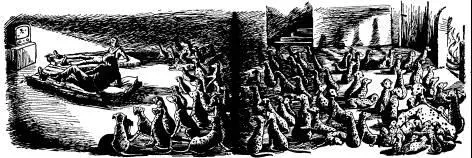
He felt a special sympathy for the big pups in the two back rows. Some of them were fully half-grown—young dogs rather than puppies, lollopy creatures with clumsy feet. They made him remember his own not very far-away youth. He wondered how long their skins would be safe from Cruella—would she have the patience to wait much longer? Did the big pups know that danger drew closer every day? Something in their eyes told him they did. And many of them had been in this horrible place for months, without hope until Lucky had spread the news that his father and mother were coming. Proud Lucky now, taking his father along the rows of hero-worshipping pups!
Blissfully happy, Missis sat with her children clustered about her. She had eyes only for them, but they were determined she should not miss the television. She had never seen it before (Mr. and Mrs. Dearly did not care for it) and found it difficult to follow. The pups did not follow it completely, as they had not yet learned enough human words; but they liked the little moving figures, and watched in the perpetual hope of seeing dogs on the screen.
“Can we have it when we get back home?” said the Cadpig.
“Indeed you shall, my darling,” said Missis. Somehow, somehow, the Dearlys must be made to buy a set.
Pongo had now silently “met” all the pups. He told Lucky he would like to have a good look at the Badduns. So Lucky took him a little way up the back staircase, where they could see without being noticed.
No one would have guessed that Saul and Jasper Baddun were brothers. Saul was heavy and dark, with a forehead so low that his bushy eyebrows often got tangled with his matted hair. Jasper was thin and fair, with a chin so sharp and pointed that it had worn holes in all his shirts—not that he had many. Both brothers looked very dirty.
“They never change their awful old clothes.” whispered Lucky, “and they never wash. I don’t think they are real humans, Father. Is there such a thing as a half-human?”
Pongo could well believe it after seeing the Badduns, but he couldn’t imagine what their non-human half was. It was no animal he had ever seen.
“Have they ill-treated any of you?” he asked anxiously.
“No, they’re too frightened of being bitten,” said Lucky. “They’re terrible cowards. Some of the big pups did think of attacking them—but there seemed no way of getting out. And if they’d killed the Badduns, there would have been no one to feed us. Oh, Father, how glad I am you’ve come!”
Pongo licked his son’s ear. Pups, like boys, do not like fathers to be too sentimental (mothers are different), but this was a very private moment.
Then they went and sat with Missis and the family. It seemed strange that they could all be so peaceful right in the enemy’s camp. Gradually the Pongos’ puppies fell asleep—all except Lucky, Patch, and the Cadpig. Lucky was not sleepy. Patch was—but stayed awake because the Cadpig was awake. And the Cadpig stayed awake because she was crazy about television.
Many of the big pups, too, were lying down to sleep, stretching luxuriously, feeling—for the first time since they had been imprisoned in Hell Hall—that there was someone they could rely on. Pongo had come! And Missis too. They had looked at her shyly, quite understanding that she must care for her own children first, but hoping she would have a little time for them later. Some of them could hardly remember their mothers. But the younger pups could remember theirs and they were not sleeping. Slowly, silently, they were inching their way towards Missis.
Читать дальше
